 Petzlover
Petzlover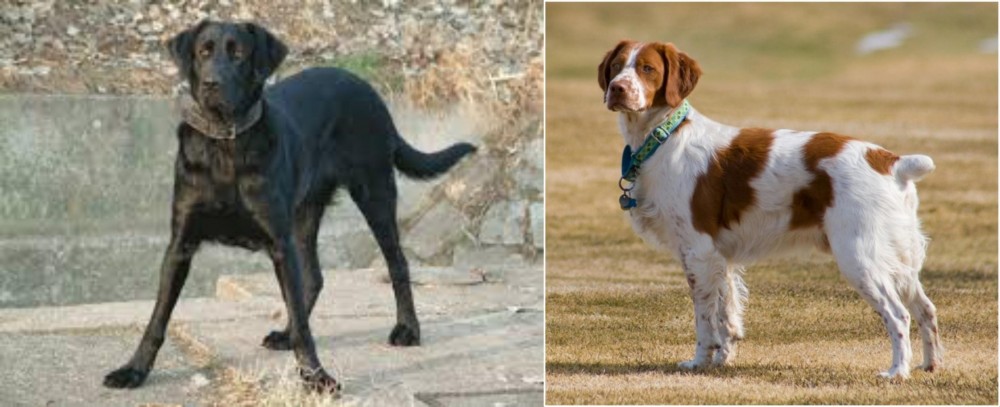 Cao de Castro Laboreiro is originated from Portugal but French Brittany is originated from France. Cao de Castro Laboreiro may grow 40 cm / 16 inches higher than French Brittany. Cao de Castro Laboreiro may weigh 50 kg / 111 pounds more than French Brittany. Both Cao de Castro Laboreiro and French Brittany has almost same life span. Both Cao de Castro Laboreiro and French Brittany has almost same litter size. Both Cao de Castro Laboreiro and French Brittany requires Low Maintenance.
Cao de Castro Laboreiro is originated from Portugal but French Brittany is originated from France. Cao de Castro Laboreiro may grow 40 cm / 16 inches higher than French Brittany. Cao de Castro Laboreiro may weigh 50 kg / 111 pounds more than French Brittany. Both Cao de Castro Laboreiro and French Brittany has almost same life span. Both Cao de Castro Laboreiro and French Brittany has almost same litter size. Both Cao de Castro Laboreiro and French Brittany requires Low Maintenance.
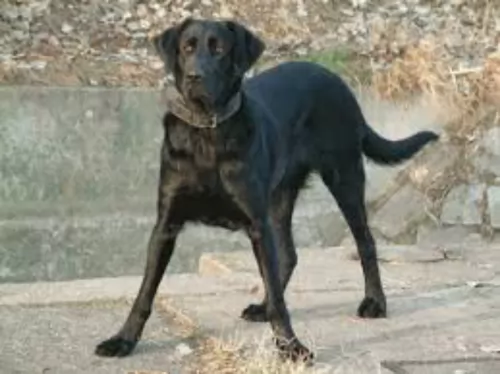 Cão de Castro Laboreiro originates from Portugal. Also known as the Portuguese Cattle Dog he was used long ago to guard livestock. Today, the modern Cao de Castro Laboreiro is descended from the molosser type dog.
Cão de Castro Laboreiro originates from Portugal. Also known as the Portuguese Cattle Dog he was used long ago to guard livestock. Today, the modern Cao de Castro Laboreiro is descended from the molosser type dog.
There are hints to the dog's origins from the 19th century, but changes in agricultural methods meant a disappearance of the dog as a livestock protector. Today the dog is mostly kept as a pet and was first seen at a dog show in 1914.
The Cão de Castro Laboreiro is recognized by the Fédération Cynologique Internationale as well as being recognized by the United Kennel Club in the United States.It is a rare dog and not many exist today but in Portugal, the USA and United Kingdom you will find a few breeders.
 Brittanys are the product of France, actually developed in the Brittany Province. They are gun dogs designed to hunt birds. Referred to more often than not as a Spaniel their method of working is much more in line with the setters and pointers. They are believed to be developed somewhere between the 17th and 19th centuries, but not recognized until the 20th century. Orange and white dogs were portrayed on 17th century tapestries, hunting and retrieving. In 1850 the Reverend Davies wrote the first record of Brittanys that was verifiable.
Brittanys are the product of France, actually developed in the Brittany Province. They are gun dogs designed to hunt birds. Referred to more often than not as a Spaniel their method of working is much more in line with the setters and pointers. They are believed to be developed somewhere between the 17th and 19th centuries, but not recognized until the 20th century. Orange and white dogs were portrayed on 17th century tapestries, hunting and retrieving. In 1850 the Reverend Davies wrote the first record of Brittanys that was verifiable.
The Brittany was recognized for the first time in 1907 as their own breed even though they participated in the Paris Dog Show in 1900. Once recognized the standards were written as well. It was not until 1931 that the breed was recognized in America and 1934 before the American Kennel Club approved them. Until 1982 they were known as the French Brittany Spaniel. The Spaniel was dropped in ’82. In the United Kingdom the Brittany is known as an HPR (Hunt, Point and Retrieve) breed and they do so with both birds and small game such as hares. The Brittany’s have more dual champions than any other American Kennel Club Sporting Breed in both Confirmation and Field Trials.
There are some differences between the current day French Brittany and the “American Brittany”. They are the same breed but different sub-sets and there are differences that can be noted between the two. The French Brittany is smaller than the newer American version and works closer to the hunter and the guns, while the American Brittany runs ahead of the hunter quite often. Some breeders however don’t consider these differences to be sub-sets and believe that the American breeders should accept the French standards reflecting the origin of the breed.
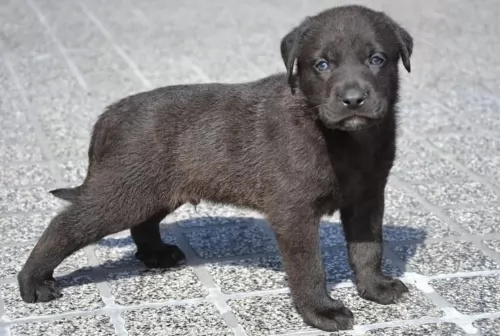 The Cão de Castro Laboreiro is a large dog, with height being in the region of 55 to 60cm and weight being in the region of 45 - 70kg. People describe the dog as wolf-like with a coat that is fairly short, thick and course. The coat is brindle with a base color of shades of grey, chestnut and black.
The Cão de Castro Laboreiro is a large dog, with height being in the region of 55 to 60cm and weight being in the region of 45 - 70kg. People describe the dog as wolf-like with a coat that is fairly short, thick and course. The coat is brindle with a base color of shades of grey, chestnut and black.
This large mastiff-type dog always has a black nose, his tail is long and carried high, but never curling over the back. He has a broad head and is much like the Labrador in looks, being free of wrinkles on the face.The ears of the Cao de Castro Laboreiro are medium-in-size and floppy while the eyes are dark brown.
The Cao de Castro Laboreiro makes an excellent pet as he forms strong bonds with his human family. He is territorial and makes an exceptional guard dog. He doesn’t particularly like strangers and is aloof around them.
This is an intelligent dog breed, he is strong-willed and stubborn, but when he is around the children in the family he is gentle and loving. When he has been trained and socialized, which is always highly recommended with every dog, he gets along with other pets in the home too.
 The French Brittany is an energetic, compact, solid, athletic dog. They have average size heads, intelligent expressions, floppy ears, and a long, elastic and free gait. Most Brittanys are born with short tails but if not, they are docked outside the United Kingdom. Docking is illegal in the United Kingdom so those Brittanys might have a long tail.
The French Brittany is an energetic, compact, solid, athletic dog. They have average size heads, intelligent expressions, floppy ears, and a long, elastic and free gait. Most Brittanys are born with short tails but if not, they are docked outside the United Kingdom. Docking is illegal in the United Kingdom so those Brittanys might have a long tail.
Their coats are orange roan, orange and white and liver roan. A tricoat of orange, liver and white is allowed within a specific placement of the three colors.
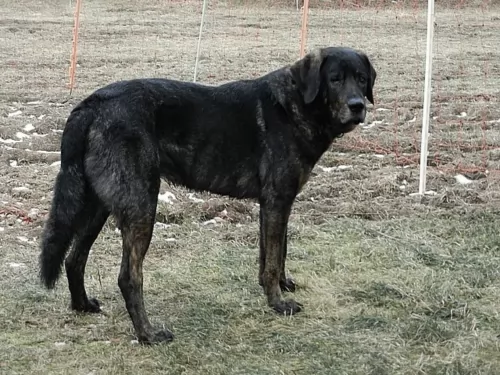 Environment and upbringing have plenty to do with how a dog turns out. People who just buy a dog for guardian purposes and nothing else can’t expect companionship in return.
Environment and upbringing have plenty to do with how a dog turns out. People who just buy a dog for guardian purposes and nothing else can’t expect companionship in return.
The Cão de Castro Laboreiro has always been a fearless guardian of livestock with his strong protective characteristics. He is intelligent and recognizes that a child in the family needs his protection.
This is a large dog who is strong, brave and intelligent but with his human family he is gentle, loving and loyal. Nonetheless he still requires a firm owner, and if you’re fair and firm with him you get the best with him. With this dog you can form a close friendship and bond.
Dual champions in Field Trials and Confirmation. They both point and retrieve.
They are not as adaptable as some hunting breeds. They are very active and need space both indoors and out. They are not recommended for life in apartments in the city. A rural environment is best. They do not adapt well to the damp and cold weather.
They are very intelligent and have very high learning ability.
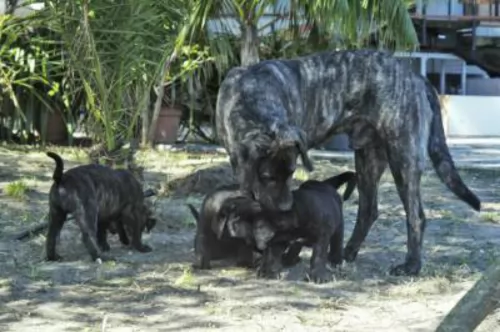 The Cão de Castro Laboreiro is generally a healthy breed, but even so, it is good to be aware of typical canine diseases that your pet may develop.
The Cão de Castro Laboreiro is generally a healthy breed, but even so, it is good to be aware of typical canine diseases that your pet may develop.
There are many eye problems that dogs have to contend with and if you see any kind of ulceration in your dogs eye, get veterinary advice.
A dog should always have access to a shady spot. Never ever leave your dog in a hot car. Heat builds up quickly and death can result soon as the body temperature rises.
Roundworm and tapeworm can infest dogs and you’ll need to speak to your vet about a worming program. Lice, mites and ticks are all parasites which attach themselves to the skin.
 Generally, a hardy breed that is mostly healthy, the Brittany in France usually lives on average 12 years 6 months. In the UK the average if 12 years and 11 months and many dogs living to be 14 or 15. Some of the health issues that might pop up for the Brittany include:
Generally, a hardy breed that is mostly healthy, the Brittany in France usually lives on average 12 years 6 months. In the UK the average if 12 years and 11 months and many dogs living to be 14 or 15. Some of the health issues that might pop up for the Brittany include:
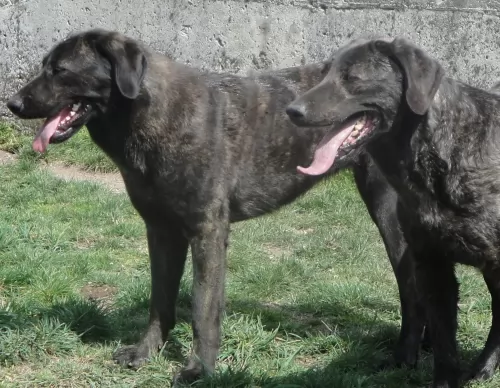 The Cao de Castro Laboreiro has a short coat which requires minimal grooming. Brushing him twice a week to rid him of loose hairs will suffice.
The Cao de Castro Laboreiro has a short coat which requires minimal grooming. Brushing him twice a week to rid him of loose hairs will suffice.
Nail clipping as well as ear- and teeth cleaning are other routine maintenance procedures for your pet.
The food you give your pet must be well-balanced and have protein and carbohydrates. If you want his skin and hair to remain healthy, vitamins, fatty acids and minerals will also be needed.
Boneless chicken and fish, brown rice and vegetables can be a good choice as well as some of the top quality commercially manufactured foods. An active dog will always need a higher protein content and therefore including raw meat into the diet is imperative – not every day as it can be very expensive, but every other day.
Remember that bones can be dangerous as they can splinter and cause your pet internal damage. Fresh, cool water must be available at all times.
 Feed puppies a high quality puppy food designed for medium sized dogs. Give about one to one and a half cups per day in 2-3 meals.
Feed puppies a high quality puppy food designed for medium sized dogs. Give about one to one and a half cups per day in 2-3 meals.
For the adult French Brittany feed a high quality adult dry food designed for medium sized dogs. Give about two cups per day in 2 meals.
Excellent vision and scent
The French Brittany is an active and enthusiastic bird dog that loves to exercise. They have the stamina and drive that goes with an efficient and successful hunting dog. They need daily exercise, regular walks and excel at field trials and confirmation. They are also good at lure chase, flyball, rally and obedience.